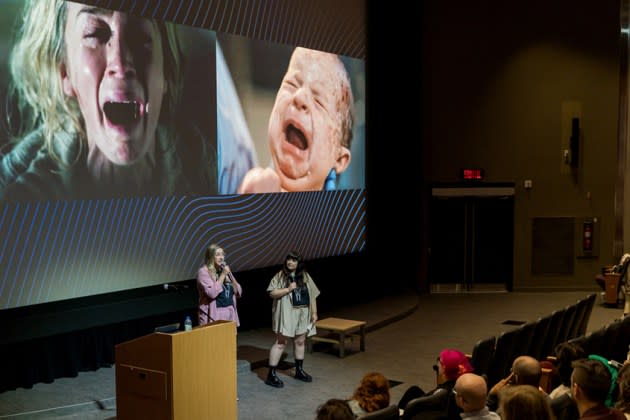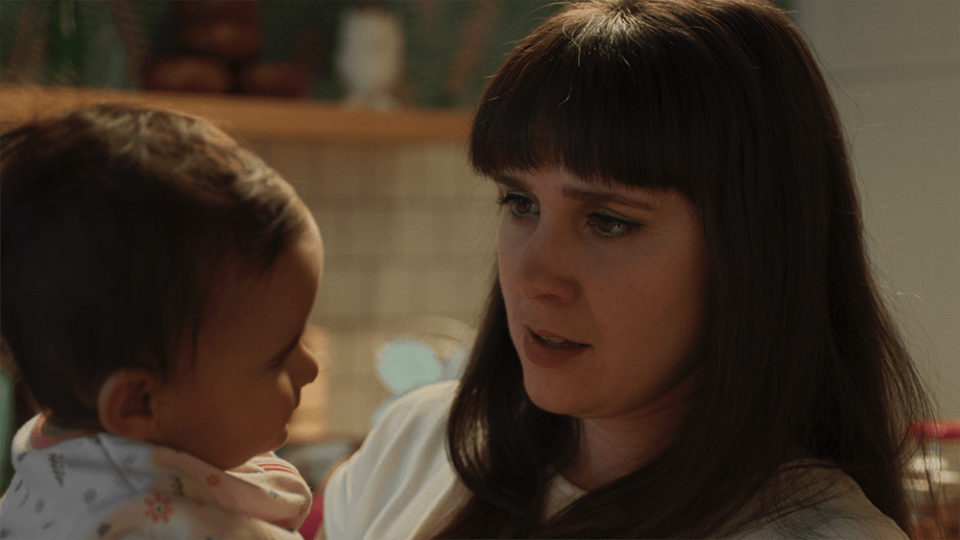Frontières Winner ‘Freya’ Takes on ‘Extreme’ Pro-Birth Future: ‘If This Was Happening to Men, There Would Be World War III’

Rhona Rees is ready to shock with “Freya,” set in the near future where abortion is completely illegal and contraception is only available to men.
“That’s what I like about sci-fi. If we show an extreme future that’s still preventable, it will allow us to start a conversation,” she says.
More from Variety
“I get really emotional when I talk about it. It’s unbelievable, the way we are sliding backwards in human rights, because women’s rights are human rights. If this was happening to men, there would be World War III.”
Now in development, “Freya” was recently awarded at Frontières, winning PurpleDOG Post’s post-production prize worth CAD$ 10,000 ($7,576). Kristyn Stilling and Athena Russell produce for Freya Films.
Rees has already explored a similar universe in a 2020 short directed by Camille Hollett-French, which she wrote and starred in as Jade, pregnant after a one-night stand. Suddenly, the government-mandated AI assistant, Freya, starts controlling her life instead of making it simpler.
“When I wrote it, I heard the first whispers that Roe vs. Wade could be at risk. Then the walls kept closing in on women’s rights, particularly in North America, and it didn’t feel like science fiction. It felt… possible,” notes Rees, admitting she will “increase the pressure” on her protagonist in the feature.
“At first, Jade is a compliant citizen. She loves Freya. We will see her go from a believer in the system to someone who wants to reject this almighty tool.”
According to Russell, there are three main themes in the film: Autonomy, technology and connection.
“When Freya turns on Jade, it’s the human relationships that offer some hope in this bleak world,” she says, with Rees adding:
“We are taking on abortion rights, obviously, but it’s also a warning against AI and the use of our personal data. As proven by Hollywood strikes, we are starting to realize its real implications. We never read these ‘terms and conditions.’ It’s time we started doing that.”
Mentioning “Black Mirror” among her influences – “You can see yourself so easily in the worlds they create” – and “The Handmaid’s Tale,” without the religion, Rees is making sure “Freya” will surprise the viewers.

“What will set our story apart is that there is no visual surveillance. Jade has to communicate using sign language, which is forbidden for regular citizens.”
Also, the place she ends up in after she’s caught buying black market abortion pills, isn’t exactly sinister. At least not at first.
“We are calling it a ‘conversion therapy prison’ and it’s an Instagrammer’s delight: the color palette is blush, they are feeding her organic kale salads. There are no armed guards, but everyone is still enforcing the rules on Freya’s behalf,” she explains.
“When you are forced to bring life into this world, it doesn’t matter how ‘soft’ your prison is. It’s still my personal idea of hell. Motherhood is touted as this almost divine calling, but one of the things I really don’t want to explore is why Jade doesn’t want the baby. It doesn’t matter. It’s her choice.”
The team, working on the second draft of the script with Monster Pictures – which has provided a letter of intent for Australian and New Zealand distribution – is hoping to start shooting soon.
“There is definitely a sense of urgency. You go: ‘Could it actually happen in 10, 15 years?’ I keep saying that when we created the short, it was science fiction. Now, it feels like science fact,” says Russell.
Kristyn Stilling adds: “At Frontières, we talked to people from countries where abortion isn’t legal, like Poland, and they were sharing all these nightmarish stories. Many women are responding to it in a very visceral way.”
But while female filmmakers are finally getting their due on the festival circuit, the team wants to engage even more viewers.
“Women filmmakers and diverse filmmakers are not some ‘hot trend.’ [What’s happening now], it’s encouraging, but business wants to be business. We need these things to make money,” she says, with Rees pointing out: “There is an interesting overlap that we are going to have in our audience, because people who are against government control are usually pro-life. Or rather ‘pro-birth,’ because they don’t give a bleep about what happens to these babies afterwards.”
“We don’t want to talk only to the people who already agree with us. Yes, it’s for them, but it’s important that we reach a wider audience. Otherwise, we can’t really change anything.”

Best of Variety
Sign up for Variety’s Newsletter. For the latest news, follow us on Facebook, Twitter, and Instagram.

